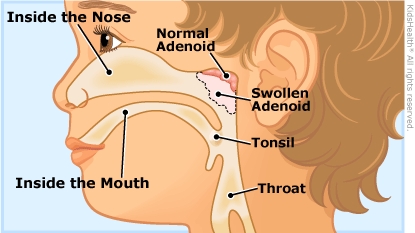After an adenoidectomy, kids may have throat pain, bad breath, noisy breathing, and a stuffy nose for a few days. This information can help you care for your child at home while they recover.



Your child:


What are the adenoids? The adenoids are a patch of tissue in the back of the nasal passage. They help trap germs and keep us healthy, especially in babies and young children. As children grow older, the adenoids get smaller. Adenoids can get bigger from infection or allergies.
Will my child's immune system be weaker without adenoids? Even though the adenoids are part of the immune system, removing them doesn't affect the body's ability to fight infections. The immune system has many other ways to fight germs.